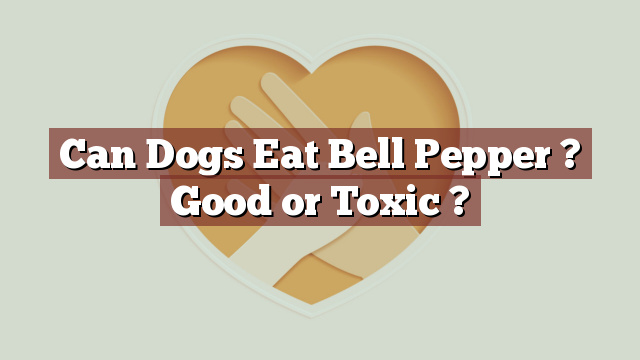Can Dogs Eat Bell Pepper? Good or Toxic?
It is important for pet owners to be aware of what foods are safe for their furry companions. While some human foods can be enjoyed by dogs, others can be harmful or even toxic to them. Bell peppers, a popular vegetable in many dishes, are a common question among dog owners. Can dogs eat bell pepper? Is it a healthy addition to their diet or should it be avoided? In this article, we will explore the nutritional value of bell peppers, discuss their safety for dogs, examine potential risks and benefits, and provide guidance on what to do if your dog eats bell pepper.
Nutritional Value of Bell Peppers: Vitamins, Minerals, and Fiber
Bell peppers are packed with vitamins, minerals, and fiber, making them a nutritious choice for humans. These vibrant vegetables are rich in vitamins A, C, and K, which are essential for maintaining a healthy immune system, promoting good vision, and supporting bone health. Bell peppers also contain minerals such as potassium and magnesium, as well as dietary fiber, which aids in digestion and promotes a healthy gut.
Can Dogs Eat Bell Pepper? Safety of Including in Their Diet
The good news is that dogs can eat bell pepper. Bell peppers are not toxic to dogs and can be safely included in their diet. However, it is important to note that dogs have different nutritional needs than humans. While bell peppers are safe for dogs, they should be given in moderation and always in appropriate portions. It is also important to remove the seeds and stem, as they can be a choking hazard or cause gastrointestinal upset.
Potential Risks and Benefits of Feeding Bell Pepper to Dogs
Feeding bell pepper to your dog can have several potential benefits. The high vitamin content in bell peppers can contribute to a strong immune system and overall good health. The fiber content can aid in digestion and help prevent constipation. Additionally, bell peppers are low in calories, making them a great choice for dogs who are watching their weight.
However, it is important to be aware of potential risks as well. Some dogs may have difficulty digesting bell peppers, leading to gastrointestinal discomfort such as gas or diarrhea. If your dog has a known sensitivity to vegetables or a history of digestive issues, it is best to consult with your veterinarian before introducing bell peppers into their diet.
What to Do if Your Dog Eats Bell Pepper: Signs and Next Steps
If your dog accidentally ingests bell pepper, there is usually no cause for concern. However, it is important to monitor your dog for any signs of gastrointestinal distress such as vomiting or diarrhea. If these symptoms persist or worsen, it is advisable to contact your veterinarian for further guidance.
Conclusion: Bell Peppers Can Be a Healthy Addition to a Dog’s Diet
In conclusion, dogs can eat bell pepper without any harm. Bell peppers offer several nutritional benefits, including vitamins, minerals, and fiber. However, it is crucial to feed bell peppers to dogs in moderation and always remove the seeds and stem. While most dogs can enjoy bell peppers without any issues, it is important to be aware of your dog’s individual sensitivities and consult with a veterinarian if you have any concerns. By following these guidelines, you can safely incorporate bell peppers into your dog’s diet as a healthy and nutritious treat.
Thank you for investing your time in exploring [page_title] on Can-Eat.org. Our goal is to provide readers like you with thorough and reliable information about various dietary topics. Each article, including [page_title], stems from diligent research and a passion for understanding the nuances of our food choices. We believe that knowledge is a vital step towards making informed and healthy decisions. However, while "[page_title]" sheds light on its specific topic, it's crucial to remember that everyone's body reacts differently to foods and dietary changes. What might be beneficial for one person could have different effects on another. Before you consider integrating suggestions or insights from "[page_title]" into your diet, it's always wise to consult with a nutritionist or healthcare professional. Their specialized knowledge ensures that you're making choices best suited to your individual health needs. As you navigate [page_title], be mindful of potential allergies, intolerances, or unique dietary requirements you may have. No singular article can capture the vast diversity of human health, and individualized guidance is invaluable. The content provided in [page_title] serves as a general guide. It is not, by any means, a substitute for personalized medical or nutritional advice. Your health should always be the top priority, and professional guidance is the best path forward. In your journey towards a balanced and nutritious lifestyle, we hope that [page_title] serves as a helpful stepping stone. Remember, informed decisions lead to healthier outcomes. Thank you for trusting Can-Eat.org. Continue exploring, learning, and prioritizing your health. Cheers to a well-informed and healthier future!

